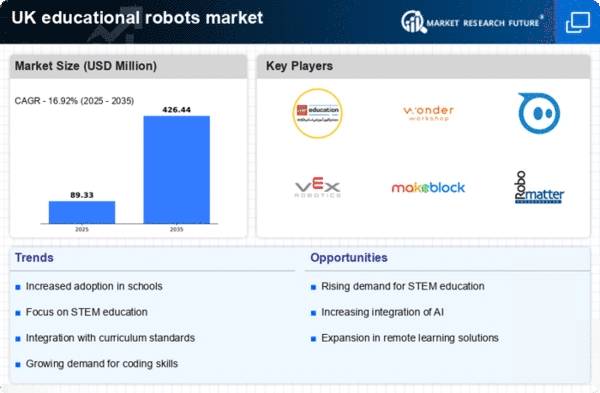Emphasis on Coding and Computational Thinking
The educational robots market is significantly impacted by the growing emphasis on coding and computational thinking within the UK education system. As the digital economy expands, there is a pressing need for students to acquire coding skills from an early age. Educational robots serve as effective tools for teaching these concepts, providing hands-on experiences that engage students in problem-solving and critical thinking. Recent statistics suggest that over 60% of primary schools in the UK have incorporated coding into their curriculum, with robots playing a central role in this initiative. This focus on coding not only enhances students' technical skills but also prepares them for future careers in technology. Consequently, the educational robots market is likely to see sustained growth as more institutions adopt robotics as a means to foster computational literacy.
Increased Investment in Educational Technology
The educational robots market in the UK is experiencing a surge in investment as schools and educational institutions allocate more funds towards technology integration. This trend is driven by the recognition of the importance of digital literacy in the modern workforce. According to recent data, educational technology spending in the UK is projected to reach £3 billion by 2026, with a significant portion directed towards robotics. This influx of capital is likely to enhance the development and deployment of educational robots, making them more accessible to students. As institutions seek to improve learning outcomes, the educational robots market is poised for growth, with innovative solutions that cater to diverse learning needs. The emphasis on technology in education is not merely a trend but a strategic move to prepare students for future challenges, thereby solidifying the role of educational robots in the curriculum.
Support for Collaborative Learning Environments
The educational robots market is benefiting from a shift towards collaborative learning environments in UK schools. Educators are increasingly recognizing the value of teamwork and communication skills in the learning process. Educational robots facilitate group activities that encourage students to work together, fostering collaboration and enhancing social skills. Research indicates that collaborative learning can lead to improved academic performance and greater retention of knowledge. As schools implement project-based learning strategies, the demand for educational robots that support group interactions is likely to rise. This trend not only enriches the learning experience but also positions the educational robots market as a key player in the development of essential soft skills among students.
Growing Demand for Personalized Learning Solutions
The educational robots market is increasingly influenced by the demand for personalized learning experiences. Educators are recognizing that students have varied learning styles and paces, necessitating tailored educational approaches. Educational robots offer adaptive learning capabilities, allowing for customized interactions that cater to individual student needs. This shift towards personalized education is supported by research indicating that personalized learning can improve student engagement and achievement by up to 30%. As schools in the UK strive to enhance educational outcomes, the integration of robots that can adapt to different learning preferences is becoming more prevalent. This trend not only fosters a more inclusive learning environment but also positions the educational robots market as a vital component in the evolution of teaching methodologies.
Integration of Artificial Intelligence in Learning Tools
witnessing a transformative shift with the integration of artificial intelligence (AI) into learning tools. AI-powered robots can analyze student interactions and adapt their teaching methods accordingly, providing a more effective learning experience. This technology allows for real-time feedback and personalized instruction, which can significantly enhance student engagement. In the UK, the adoption of AI in education is projected to grow by 25% annually, indicating a robust interest in innovative educational solutions. As schools seek to leverage AI to improve educational outcomes, the educational robots market is likely to expand, offering advanced tools that cater to the evolving needs of educators and students alike.















